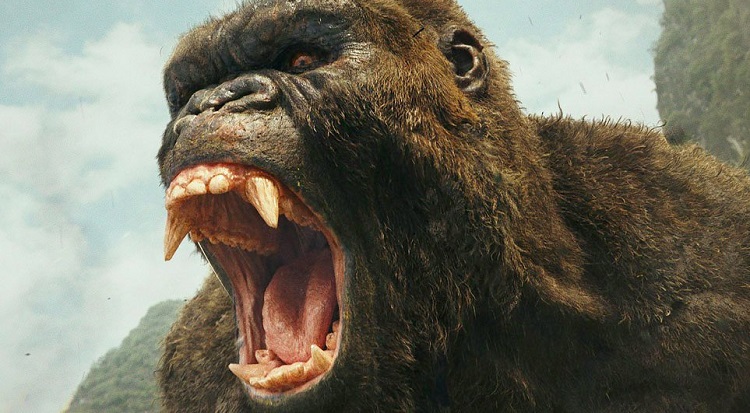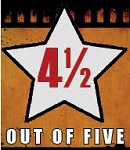

Not all monster movies are created equal. Perhaps it's appropriate given its moniker that few titles stand as iconic and beloved as 1933's King Kong. Director Merian C. Cooper's fascination with gorillas birthed a groundbreaking visual spectacle that still holds up under today's scrutiny. Which is perhaps why its success has been difficult to replicate. A 1976 effort switched out the Empire State Building for the World Trade Center and proved a mild commercial success if not a critical darling. A 2005 remake by Peter Jackson attempted to fuse the original 1933 story with CGI wizardry and a budget the size of an aircraft carrier yet elicited mostly (and deservedly) shrugs.
Kong: Skull Island is a reboot in the truest sense of the word; but in abandoning the elements of the story that fans most identify with the original film, this new effort is able to set itself apart and establish its own lore. Where Peter Jackson and Co. surgically attached their own styles and sensibilities to classic Kong, Skull Island director Jordan Vogt-Roberts (working off a script by Dan Gilroy, Max Borenstein and Derek Connolly) butchers that iconic narrative entirely, lifting only what he needs to tell an entirely new story, one completely untethered to the Kong films of old.
In: Giant ape, creepy island, man's ignorance in the face of nature's immeasurable power. Out: Pretty much everything else. This story never leaves the island. There's no overzealous director who sees the towering ape as his meal ticket. No swatting at airplanes high above NYC. What we find out from all of this is that sometimes it's better to be a butcher than a surgeon.
Skull Island picks up in 1973 with Monarch (yes, the same Monarch of 2014's Godzilla reboot) scientist Bill Randa leading an expedition to the titular Skull Island on the promise of making any number of profound scientific discoveries. It's in the early going that Skull Island drags. This film's cast is massive and there are a lot of characters to introduce early on. There is Randa's team of scientists, a rag-tag team of military escorts (fresh from the war in Vietnam) led by Lieutenant Colonel Preston Packard (Samuel L. Jackson, showing up for more than just a paycheck), wartime photographer Mason Weaver (Brie Larson), and finally there's Tom Hiddleston as James Conrad. Conrad is supposed to be a jungle-tracker of some kind and probably, I'm guessing, the main human character. But Conrad barely registers at all. Really he's just a hunk with a gun. Which is fine. For this movie to work, everything else is secondary to the big, angry gorilla in the title. Thankfully, Kong is king.
Save for a brief introduction at the very beginning, Skull Island takes its time getting to Kong. And just when it feels like the human story is about to drag even longer, Kong intervenes. It starts with a tree gingerly sailing through the windshield of a helicopter. From there it only escalates until finally, bathed in fire, Kong defiantly roars in protest of his new guests. It's one of the many shots in the film that establishes the scale of the monster along with its chaos and beauty.
Make no mistake; Skull Island is a beautifully shot film, where the camera bobs and weaves and slo-mos through all kinds of destruction without ever becoming a distraction. There's a certain Zack Snyder-ness to the cinematography here that, surprisingly, feels wholly essential when taking the high-intensity action into consideration. Vogt-Roberts actually out-Snyders Snyder and with good reason: there's too much happening on-screen not to slow things down a little.
Kong: Skull Island is similar to another ape-minded reboot I adore in Rise of the Planet of the Apes. On paper all they really share is genre and an affinity for primates. But both these films are able to take an old property and reinvent it in a way that feels authentic to our times. More so, both films put the work into imbuing their respective digital leads with character and heart. In both look and writing, Kong stands with Caesar as a fully realized dramatic character despite a lack of humanity or speech.
On the human side, two performances stand out. Samuel L. Jackson, when given an actual character and not an archetype, can still deliver the goods. His Apocalypse Now-inspired arc serves as the backbone of the narrative, and watching Jackson grow more and more unhinged was a finer point. John C. Reilly doesn't even show up until the halfway point but still ends up being most valuable on sheer charisma alone. There's a beating heart in this film all the way through and, while Kong holds most of the credit, Reilly is able to wring comedy and sympathy in a way few actors since John Candy have been able.
Skull Island's other ace in the hole is pace. I mention before that the beginning drags a little. Ultimately it's a necessary evil. This movie has a high number of characters but the flip side is that it also has a pretty high body count, surprisingly so for PG-13. The movie does a brisk job of going back and forth between small character moments and bombastic monster action. Once Kong makes his presence known, the pace quickens and the action intensifies and only lets up organically, in the few moments that call for reflection.
I like where we're at by the end of Skull Island. You might've already guessed this, but Kong has a date with another king in a few years, that being Godzilla. Thankfully, Skull Island saves most of their shared-universe world-building for a cool but visually lackluster post-credits stinger. If we're comparing the two titans' most recent campaigns, Skull Island bests Gareth Edwards' 2014 film across every conceivable category. The dryness of that film is replaced here with the beating heart of what feels like a real monster movie, as well as all the fun that comes with that distinction. Godzilla feels like a dramatic movie with some monsters. Skull Island feels like a monster movie with some drama. I'll leave it to you to judge which one is a better time in the theater.
Kong: Skull Island isn't just a damn good time, it's a revelation; a reminder of just how much fun we can have when a monster movie comes with a pulse. Where other filmmakers have tried and failed to reestablish King Kong, Vogt-Roberts has unleashed something that respects the old while paving the way for something new. Turns out the king isn't dead after all, he's just been laying low. Long live the king.











